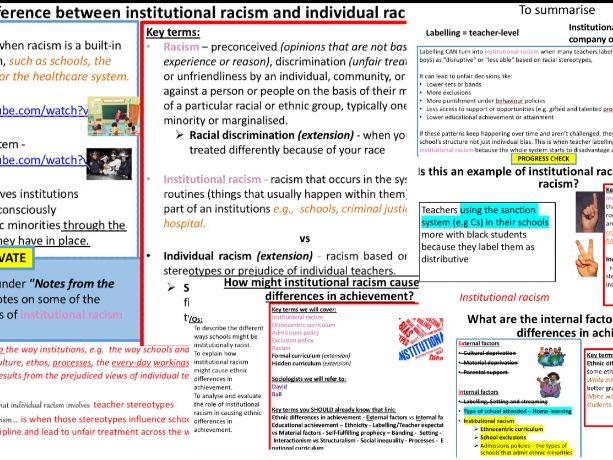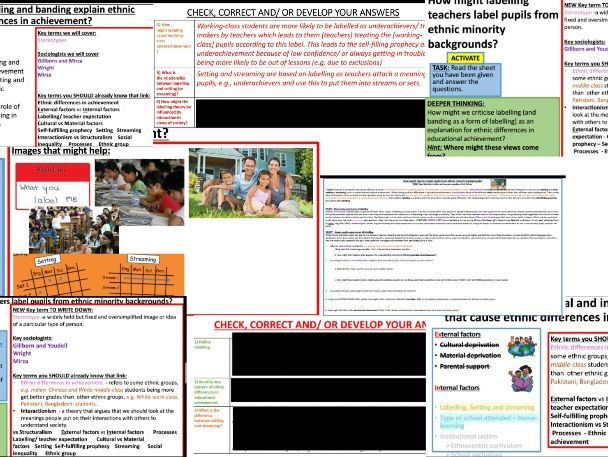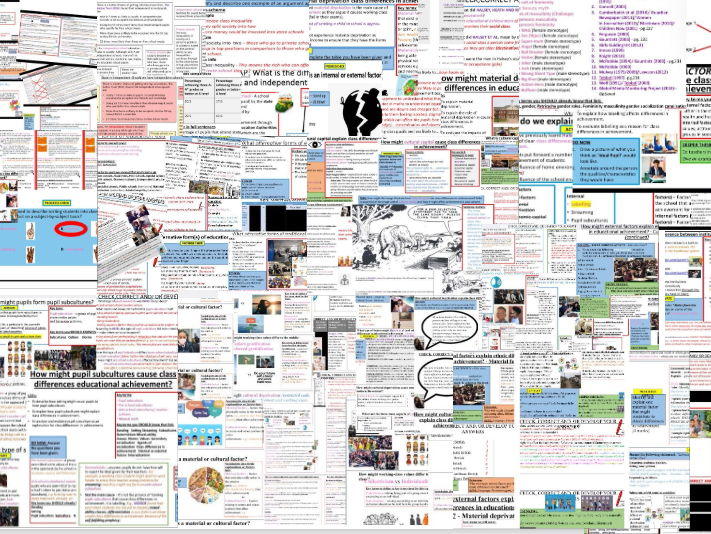Resources included (12)

AQA GCSE Sociology - Education: Alternative forms of education

AQA GCSE Sociology Education: Ethnic differences in educational achievement - Institutional racism

AQA GCSE Sociology Education: Ethnic differences in Educational Achievement - Labelling

AQA GCSE Sociology: Education - Ethnic differences in achievement (cultural factors)

AQA GCSE Sociology: Education - Ethnic diff in achievement (material deprivation)

AQA GCSE Sociology: Education - Class diff in achievement (pupil subcultures)

AQA GCSE Sociology: Education- Class differences in achievement (Banding, Setting and Streaming)

AQA GCSE Sociology: Education- Class differences in achievement (Labelling)

AQA GCSE Sociology: Education- Class differences in achievement- Material deprivation

AQA/GCSE Sociology- Independent schools vs State schools

AQA GCSE Sociology - Education- Class differences in achievement- cultural deprivation

AQA GCSE Sociology - different stages of education and types of schools
Topic 1 - Different types of education and schools
L1 Different types of education and schools:
Detailed student led lesson on the different stages of education, the different types of schools and the state vs independent divide in education (including arguments for and against private schools). Lesson has been planned to stretch and challenge the most able and includes scaffolding to support all pupils with meeting the lesson objectives.
This lesson also goes through the different types of schools for different ages: Nursery, Primary, Secondary, Sixth form and Higher education.
PLEASE NOTE - Progress check activity requires students to think about the types of schools that apply to their school so you will need to edit it to make it relevant.
covers the following key terms: Nursery school and classes, Primary Schools, Secondary schools, Sixth form, Higher education, State schools, Academies, Free schools, Special schools, Faith schools, Grammar schools, Independent/ private schools, Specialist schools, National curriculum, Public schools (extension), Local Education Authorities (LEAs) (extension), Admission policy (extension), Ofsted (extension)
Answers included for main activities (excluding the plenary)
Includes a 3 marker with a success criteria and student-friendly mark-scheme.
Resources can be found at the end of the PPT.
L2 State vs independent education and schools:
Detailed lesson with lots of scaffolding based on adaptive teaching that help students understand independent schools vs state schools.
Cover the following key terms: Independent schools, Private schools, National curriculum, State-funded school
Covers the following sociologists: The Sutton trust (2011)
ANSWERS TO MOST ACTIVITIES INCLUDED
Key terms you SHOULD know that link: State schools, Independent/ private schools, national curriculum, Public school (extension), Admission policy (extension), Marxism.
L3 Alternative forms of education and schooling:
Detailed lesson with lots of scaffolding based on adaptive teaching that help students understand alternative forms of traditional education (e.g. describe the alternative forms of educational provision, explain how the different forms of educational provision differ to traditional forms of education, analyse and evaluate the alternative forms of educational provision.
Covers the following key terms: Home education/ home-schooling, Democratic education/ de-schooling, Vocational education and training
Key sociologists mentioned that students should already be aware of: Illich (extension)
Answers to all main activities included
Resources can be found at the end of the PPT.
Topic 2 - Class differences in educational achievement
L4 Material deprivation:
Covers the following key terms: Class differences in educational achievement, Educational achievement, External factors (home factors), Internal factors (school factors), Social class
Covers the following sociologists: Halsey, Heath, Ridge (1980)
Key term and definition sheet for the lesson included
ANSWERS TO ALL ACTIVITIES INCLUDES
Teaching to all activity included
Makes references to key terms students should know- Promotes a spiral curriculum by making links to key terms that students might have previously been taught that link to this lesson.
RESOURCES CAN BE FOUND AT THE END OF PPT.
L5 Cultural deprivation:
Detailed lesson with lots of scaffolding based on adaptive teaching that help students understand
Cover the following key terms:
Material factors
Cultural factors
Cultural deprivation
Speech code
The elaborate code
The restricted code
Subculture
Immediate gratification
Deferred gratification
Collectivism
Individualism
Fatalism
Present-time orientation
Future orientated
Key terms you should already know that link:
Class differences in achievement
Educational achievement
External achievement
External factors
Internal Factors
ANSWERS TO ALL MAIN ACTIVITIES INCLUDED
RESOURCES CAN BE FOUND AT THE END OF PPT
Teaching to all technique included
L6 Cultural capital:
Detailed lesson with lots of scaffolding based on adaptive teaching that help students understand the three types of identified by Bourdieu. Students will also be able to explain the role of cultural capital in causing class differences in achievement.
Two plenaries to choose from
Exam style question
Student friendly mark scheme
Cover the following key terms: Cultural capital
Educational capital
Economical capital
Selection by mortgage (extension)
Covers the following sociologists:Bourdieu, Sugarman, Leech and Campos (extension), KEDDIE, BLACKSTONE AND MORTIMORE
Key terms you should know: Culture, Norms Values, Agency and agents of socialisation, Primary socialisation, Meritocracy
Resources can be found at the end of PPT
Some answers to activity are included
key term sheet for the lesson attached.
L7 Labelling:
Detailed lesson with lots of scaffolding based on adaptive teaching that help students understand class differences in achievement.
Covers the following key terms: Labelling, Self-fulfilling prophecy/Pygmalion effect, the ‘Halo effect’
Covers the following sociologists: Becker, Rosenthal and Jacobson
Includes key term and definition sheet needed for the lesson.
Includes a discussion activity to promote oracy and engagement
includes a 3 marker and detailed scaffolding to help students answer it. Also includes a student-friendly marker for self or peer assessment.
ANSWERS FOR MOST ACTIVITIES INCLUDED
Promotes a spiral curriculum by making links to key terms that students might have previously been taught that link to this lesson.
Resources can be found at the end of the PPT.
L8 Banding (Setting & Streaming):
Detailed lesson with lots of scaffolding based on adaptive teaching that help students understand class differences in achievement (setting and streaming)
Covers the following key terms: Banding, Setting, Streaming, Mixed-ability class
Covers the following sociologists: Ball
Includes a starter activity that recaps content on class difference sin educational achievement that students should have covered so far and answers to these.
ANSWERS TO ALL ACTIVITIES INCLUDED
Includes a ‘teaching to all’ activity
Includes key term and definition sheet for the lesson
Promotes a spiral curriculum by making links to key terms that students might have previously been taught that link to this lesson.
L9 Pupil subcultures:
Detailed lesson with lots of scaffolding based on adaptive teaching that help students describe how setting might cause pupils to form pupil subcultures. To explain how pupil subcultures might explain class differences in achievement . Students will also be able to analyse and evaluate pupil subculture as an explanation for class differences in achievement
Cover the following key terms: pro-school subcultures, anti-school subcultures/counter-cultures
Covers the following sociologists: Willis
ANSWERS TO SOME MAIN ACTIVITIES INCLUDED .
key terms students should know: Banding, setting, pupil subculture, Norms, Values
RESOURCES CAN BE FOUND AT THE END OF PPT
Topic 3 - Ethnic differences in educational achievement
L10 Ethnic differences in educational achievement - Cultural factors:
Detailed lesson with lots of scaffolding based on adaptive teaching that help students understand the patterns of ethnic differences in educational achievement and the role of cultural factors in causing ethnic differences in achievement. Lastly, to analyse and evaluate the role of different cultural factors in causing ethnic differences in achievement.
Cover the following sociologists: Lupton, Sewell, Clarke, Bhatti, Sugarman, Bernstein
Covers the following key terms: Ethnic differences in educational achievement, ethnicity
Answers to all main activities included
Key terms students should know Race, Ethnic groups
Introduces students to the patterns of ethnic differences in educational achievement.
Main activity is planned as a carousel activity that allows students to collect information on the cultural factors that might affect different ethnic groups and capture this on a sheet that I printed in A3.
RESOURCES CAN BE FOUND AT THE END
L11 Ethnic differences in educational achievement - Material factors:
Detailed lesson with lots of scaffolding based on adaptive teaching that help students understand the relationship between poverty and ethnicities.
To understand the role of material deprivation in causing ethnic differences in achievement. Lastly, to analyse and evaluate the role of material deprivation in causing ethnic differences in achievement.
Cover the following key terms: Racism, Racial discrimination
Key terms students should know: Ethnic differences in achievement, External factors vs Internal factors, Cultural vs Material factors, Cultural deprivation, Culture, Norms, Values, Speech codes, Restricted code vs Elaborate code, Social inequality, Primary socialisation
RESOURCES CAN BE FOUND AT THE END OF PPT
Answers to MAIN activity included
Includes a discussion activity with prompts and sentence starts to promote oracy.
Includes a 4 marker with detailed scaffolding to help students with answering it.
L12 Ethnic differences in educational achievement - Labelling & Banding:
Detailed lesson with lots of scaffolding based on adaptive teaching that help students understand how labelling, setting and streaming might affect achievement. Students will be able to explain how labelling, setting and streaming might cause ethnic differences in achievement.
Cover the following key terms: stereotypes
Covers the following sociologists: Gillborn and Mirza, Wright, Mirza, Youdell and Interactionist
Key terms you should know: Ethnic differences in achievements - External factors vs Internal factors - Labelling/ teacher expectation - Cultural vs Material factors - Self-fulfilling prophecy – Setting - Streaming - Interactionism vs Structuralism - Social inequality- Processes - Ethnic group – Educational achievement
Resources can be found at the end of PPT
Lesson also covers banding (setting and streaming) as a form of labelling.
Teaching to all activity included as a progress check activity
ANSWERS TO MOST ACTIVITIES INCLUDED
Visual icons included
Starter activity involves students recapping previous knowledge that students should know about ethnic differences in educational achievement, labelling (learnt during class differences in educational achievement), banding (setting and streaming) and interactionism.
L13 Ethnic differences in educational achievement - Institutional racism:
Includes a teaching to all activity
ANSWERS FOR SOME ACTIVITIES INCLUDED
Includes two videos as activities
Cover the difference between individual and institutional racism and how labelling links to both.
Detailed lesson with lots of scaffolding based on adaptive teaching that help students understand how institutional racism might cause ethnic differences in achievement.
Cover the following key terms: Institutional racism, Ethnocentric curriculum, Admissions policy, Exclusion policy and Racism. Formal curriculum (extension) and Hidden curriculum (extension)
Covers the following sociologists: David and Ball
key terms you should know: Ethnic differences in achievement - External factors vs Internal factors – Educational achievement – Ethnicity - Labelling/Teacher expectation - Cultural vs Material factors - Self-fulfilling prophecy – Banding - Setting - Streaming - Interactionism vs Structuralism - Social inequality - Processes - Ethnic group - national curriculum
Resources can be found at the end of PPT.
Something went wrong, please try again later.
This resource hasn't been reviewed yet
To ensure quality for our reviews, only customers who have purchased this resource can review it
to let us know if it violates our terms and conditions.
Our customer service team will review your report and will be in touch.
